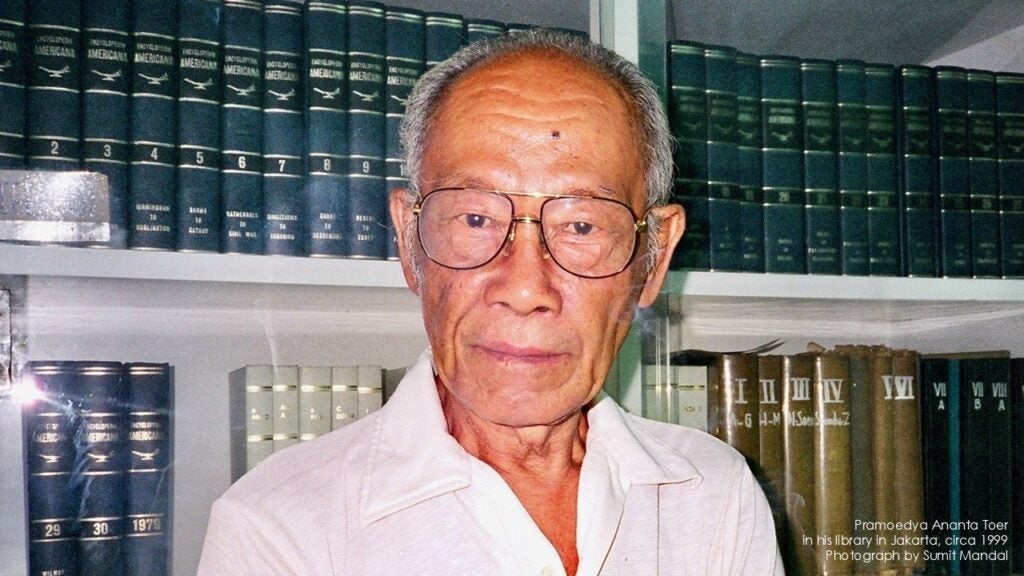Events
ARABIA ASIA TRANSREGIONAL STUDIES ROUNDTABLE SERIES – Pramoedya Ananta Toer: Revisiting the Indonesian Author’s Work on the Centenary of His Birth
| Date | : | 06 Feb 2025 |
| Time | : | 16:00 – 17:30 (SGT) |
| Venue | : | Hybrid (Online via Zoom & AS8 04-04) |
| Contact Person | : | LIM, Zi Qi |
This roundtable discussion is organised by the Muhammad Alagil Distinguished Professorship in Arabia Asia Studies at the Asia Research Institute, National University of Singapore.
CHAIRPERSON
Assoc Prof Taomo Zhou, Department of Chinese Studies, National University of Singapore
PROGRAMME
| 16:00 |
WELCOME REMARKS |
| 16:05 |
PRESENTATIONS |
| 17:05 | QUESTIONS & ANSWERS |
| 17:30 | END |
ABSTRACT
Pramoedya Ananta Toer (1925-2006) is considered one of the foremost Indonesian authors. He was a novelist, essayist, and historian whose body of work was marked by an inclusive and critical politics that went against the grain of nationalism in independent Indonesia. In the Buru Tetralogy, the author envisions an Indonesia that was constructed not only by those considered indigenous but the Chinese, Indians, Arabs, Europeans and others who inhabited the nation. At the same time, his work places at the centre subaltern groups such as women and peasants. Pramoedya’s attention to cultural inclusivity and subaltern groups was a rare combination in Indonesia and, arguably, other newly independent nation-states across Asia and Africa.
Pramoedya’s framing of an inclusive and critical nationalism has not been sufficiently highlighted and deserves further attention at this time because of the challenges to identity, belonging, social cohesion, and human security by new forms of exclusive nationalisms in a multi-polar world. From India to Israel, territorial claims along ethnic and religious lines have deepened—often with devastating outcomes—and draw on reified understandings of the past, as demonstrated by Nadim N. Rouhana and Nadera Shalhoub-Kevorkian (Cambridge, 2021). Contested understandings of national histories are central to the contemporary crisis.
On the occasion of the centenary of Pramoedya’s birth, this roundtable revisits our understandings of nation-states, keeping in mind the centrality of history. Adrian Vickers (Cambridge, 2013) observes that Pramoedya was “[o]ne of the few Indonesians with a coherent and developed vision of the nation’s history”. On the one hand, Pramoedya’s understanding of Indonesia is founded on the view that the nation-state is constituted by creole histories and anticipates the research and debate sparked by Arabia Asia and Inter-Asian Studies in the past two decades. On the other hand, as Vickers observes, Pramoedya’s hopes for a socially just and prosperous Indonesia remain a struggle. Taking these lines of thinking as cues, the roundtable explores the narratives and conceptual foundations of Pramoedya’s work and how they might be significant today.
ABOUT THE SPEAKERS
Sumit Mandal is Muhammad Alagil Chair in Arabia Asia Studies at the National University of Singapore. He is a transregional historian who researches the outcome of longstanding inter-cultural and inter-religious interaction in the Malay World—understood as a flexible and expansive cultural geography. His current research explores keramat (Muslim shrines) in the Indian Ocean as the built archives of a little-known past enmeshed in individual acts of intellectual and political leadership, inter-cultural interaction, transregional connections, piety, and miracles. This research has taken him to Java, Sumatra, Singapore, the Malay Peninsula, and the Cape Peninsula (South Africa). He is the author of Becoming Arab: Creole Histories and Modern Identity in the Malay World (Cambridge, 2018).
Fathun Karib is a jointly appointed postdoctoral fellow under the Deutsches Institut für Japanstudien-Asia Research Institute (DIJ-ARI) Research Partnership on Asian Infrastructures and affiliated with the Inter-Asia Engagements and Science, Technology, and Society Clusters at ARI, National University of Singapore. He also works as a sociology lecturer at the Department of Sociology, Syarif Hidayatullah Jakarta Islamic State University. He holds a PhD in Sociology from the State University of New York at Binghamton. His current research interests are energy and environmental history, critical agrarian studies, the Anthropocene/Capitalocene, the political economy of disasters, commodity frontiers, and the history of geology as a science. At ARI, he is working on the research project titled “Global Gasification: The Emergence of the Indonesian Natural Gas Frontier and the Making of a Gas Assemblage”. This project is part of his dissertation, “Living in the Ruins of the Capitalocene”, which is being developed into a book manuscript.
Nor Ismah is a postdoctoral fellow in the Religion and Globalisation Cluster at the Asia Research Institute (ARI), National University of Singapore. She has extensive experience managing projects for universities, think tanks, and non-governmental organizations, including baseline studies, evaluation research for development programs, gender and media training, and curriculum development. Her research focuses on the intersection of gender studies, women’s knowledge production, media, and Islam in the Indonesian context. Her forthcoming Edinburgh University Press book Women Issuing Fatwas: Female Islamic Scholars and Community-Based Authority in Java, Indonesia, is anticipated to make a significant contribution to the field. At ARI, she plans to develop the research project titled “Religious Networks and Gender Dynamics: A Study of Female Islamic Authority in Southeast Asia”, building on her doctoral research.
REGISTRATION
Registration is closed, and instructions on how to participate in this hybrid talk has been sent out to registered attendees. Please write to ziqi@nus.edu.sg if you would like to attend the event.



